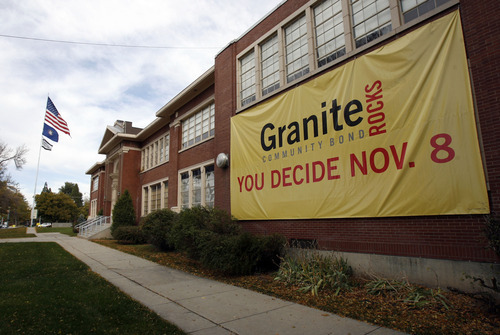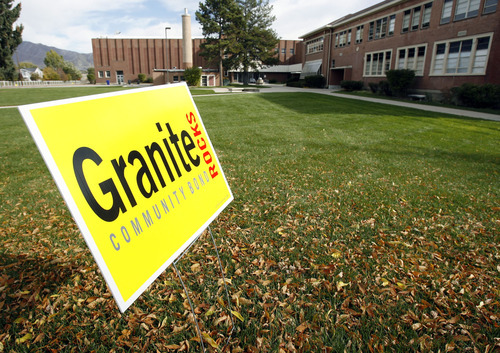This is an archived article that was published on sltrib.com in 2011, and information in the article may be outdated. It is provided only for personal research purposes and may not be reprinted.
A community group is accusing South Salt Lake of violating state law by using taxpayer dollars to promote passage of a $25 million bond to buy Granite High and convert the campus into a community gathering place.
Citizens for a Responsible South Salt Lake said the city spent more than $92,000 in city money to support the "Granite Rocks" campaign, including the hiring of a consulting firm to build backing for the bond proposal in Tuesday's election.
City Councilman Casey Fitts said the city did nothing wrong, retaining The Exoro Group to find out what residents wanted and to educate a generally apathetic electorate about the issues and opportunities involved in purchasing the 105-year-old school and its surrounding 27 acres from Granite School District.
South Salt Lake resident Ginger Fairbanks said city documents and invoices she secured through a government records request revealed the city's payments for the consulting firm, a public survey to conduct a strategic messaging campaign, banners and the distribution of other promotional materials, sometimes by city employees.
"City officials publicly contend the Granite Rocks campaign is an educational outreach effort," said Fairbanks, who spent 3½ years in the administrations of Utah Govs. Jon Huntsman Jr. and Gary Herbert.
"There is no doubt in our minds that South Salt Lake City officials have made expenditures from public funds to influence this ballot proposition," she added. "Each public official who violates this is guilty of a class B misdemeanor. We believe South Salt Lake City officials need to be held accountable for the way they have directed the use of public funds and city resources."
Fairbanks said her group, composed of about seven residents, intends to file a formal complaint with the Lieutenant Governor's Office, which oversees elections, and to ask Salt Lake County District Attorney Sim Gill to investigate the matter.
Fitts said Fairbanks' perspective does not accurately reflect what the city did or intended to do.
He said the city retained Exoro 18 months ago as part of a three-year effort to "help us gather information about what the public wants," to develop an educational campaign and to call attention to the issue so people participate.
"They were not hired at the last minute to develop a strategy of getting the bond passed," Fitts said. "One thing not unique to South Salt Lake is that there is a great deal of voter apathy. We want as many people as possible to contribute to this effort."
While Fairbanks' group may feel the "city crossed the line," he added, "I can tell you the city tried very hard to understand the rules and worked hard to stay within the rules. We [enlisted] Exoro because they understood the rules and knew what we should and shouldn't do in an attempt to expend city funds in a way that's fiscally prudent and isn't a waste of city dollars."
Twitter: @sltribmikeg —
Neutrality?
A mailer to city residents has 41 lines of type espousing bond "proponents' arguments" and three lines under "opponents' arguments," which state "while individual citizens have expressed opposition, no group or organization has communicated its opposition to the city."
The Granite Rocks website has an equal number of bullet points listing the bond proposal's pros and cons.
A "For the people, by the people" brochure claims bond passage will "discourage crime and create a safer community."
It also says "purchasing and reusing the old Granite High School property is a once in a lifetime opportunity."





